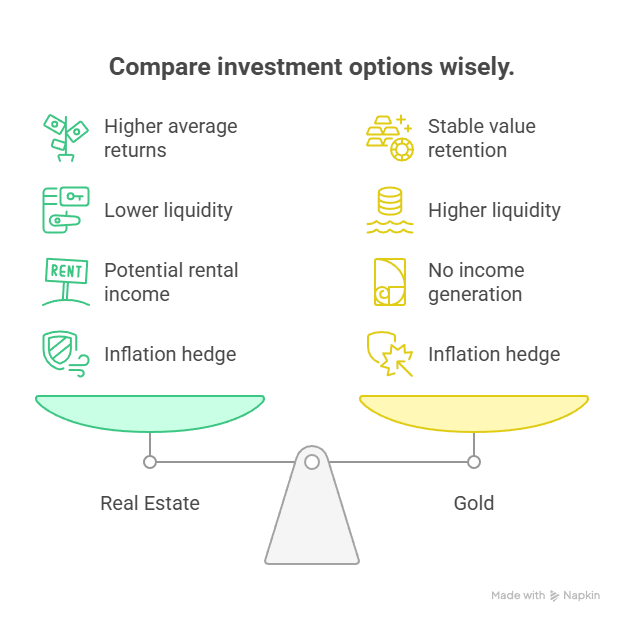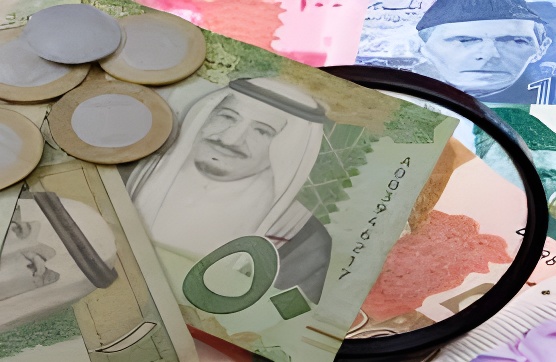
Introduction
Choosing the right investment vehicle is crucial for building wealth and securing your financial future. In 2025, two of the most debated options are real estate and gold. Both have a long history of delivering value, but which one is the better investment for today’s market? This comprehensive guide compares real estate and gold across multiple factors—returns, risk, liquidity, inflation protection, and more—to help you make an informed decision.
Real Estate Investment Overview
Benefits
- Potential for High Returns: Real estate can offer both capital appreciation and regular rental income.
- Tangible Asset: Property is a physical asset you can use, lease, or develop.
- Leverage Opportunities: Investors can use financing to amplify potential returns.
- Tax Advantages: Deductions for mortgage interest, depreciation, and certain expenses can reduce taxable income.
- Inflation Hedge: Property values and rents often rise with inflation, preserving purchasing power.
Risks
- Illiquidity: Selling property can take weeks or months.
- High Entry Costs: Down payments, taxes, and maintenance require substantial capital.
- Market Volatility: Prices can fluctuate due to economic, political, or regulatory changes.
- Management Burden: Rental properties require ongoing oversight and maintenance.
2025 Market Trends
- Urban centers like Islamabad, Lahore, and Karachi are experiencing strong demand for both residential and commercial properties.
- Lower interest rates and government incentives have made real estate more accessible.
- Digitization and regulatory reforms (such as the Real Estate Regulatory Authority) are increasing transparency and reducing fraud.
Gold Investment Overview
Benefits
- Safe Haven Asset: Gold is traditionally viewed as a store of value during economic uncertainty.
- Liquidity: Gold can be quickly sold in global markets.
- Low Maintenance: No ongoing management or maintenance required.
- Portfolio Diversification: Gold’s price often moves independently of stocks and real estate.
- Inflation Protection: Gold tends to retain value when currency purchasing power declines.
Risks
- No Passive Income: Gold does not generate rental income or dividends.
- Price Volatility: Gold prices can fluctuate sharply in the short term.
- Storage and Security: Physical gold requires secure storage, which may add costs.
- Taxation: Capital gains on gold may be taxed at higher rates in some jurisdictions.
2025 Market Trends
- Gold prices remain robust, driven by global inflation concerns and geopolitical tensions.
- Central banks continue to hold and acquire gold as a reserve asset.
- Digital gold investment platforms are making gold more accessible to retail investors.
Real Estate vs Gold: Side-by-Side Comparison
| Factor | Real Estate | Gold |
|---|---|---|
| Return Potential | High (capital gains + rental income) | Moderate (price appreciation only) |
| Liquidity | Low (can take months to sell) | High (can be sold quickly) |
| Risk | Market, management, regulatory | Price volatility, currency risk |
| Inflation Hedge | Strong (property values/rents rise) | Strong (historical store of value) |
| Tax Benefits | Mortgage, depreciation, expenses | Limited tax benefits |
| Entry Cost | High (down payment, fees) | Low (can buy small amounts) |
| Leverage | Yes (mortgage financing) | No |
| Passive Income | Yes (rental income) | No |
Factors to Consider Before Investing
- Investment Horizon: Real estate suits long-term investors; gold is better for short- to medium-term hedging.
- Capital Availability: Real estate requires more upfront capital; gold is accessible at any budget.
- Risk Tolerance: Real estate involves market, management, and liquidity risks; gold is subject to price swings.
- Income Needs: Real estate can provide steady cash flow; gold does not.
- Market Conditions: Consider current interest rates, property cycles, and gold price trends.
- Diversification: A balanced portfolio may include both real estate and gold for risk mitigation.
Expert Opinions & 2025 Market Insights
- Real Estate: Experts highlight Pakistan’s urbanization, government reforms, and declining interest rates as strong tailwinds for real estate investment in 2025. Rental yields in major cities range from 6% to 8% annually, with capital appreciation potential in high-growth corridors.
- Gold: Analysts note that gold remains a reliable hedge against inflation and currency devaluation, especially during global economic uncertainty. However, long-term returns tend to lag behind equities and real estate.

FAQs
Q: Which investment is more liquid?
A: Gold is much more liquid—it can be sold quickly in global markets, whereas real estate transactions take longer.
Q: What are the main risks of real estate vs gold?
A: Real estate risks include market downturns, illiquidity, and management hassles. Gold is exposed to price volatility and does not generate income.
Q: How do tax benefits compare?
A: Real estate offers more tax deductions (interest, depreciation, expenses), while gold’s tax benefits are limited and may face higher capital gains taxes.
Q: Can gold or real estate protect against inflation?
A: Both are strong inflation hedges, but real estate also provides income and potential for appreciation.
Conclusion
Both real estate and gold have proven their worth as investment assets. In 2025, real estate stands out for investors seeking long-term growth, passive income, and tax advantages, especially in Pakistan’s urban markets. Gold, on the other hand, remains a vital component for portfolio diversification, liquidity, and protection during economic uncertainty. The optimal choice depends on your personal financial goals, investment horizon, and risk profile.
For those interested in exploring lucrative real estate opportunities, especially in high-growth areas like New City Phase 2, you can learn more, visit the naked URL https://estatemate.pk, or browse exclusive newcity property listings for expert guidance and verified investments.













































































































